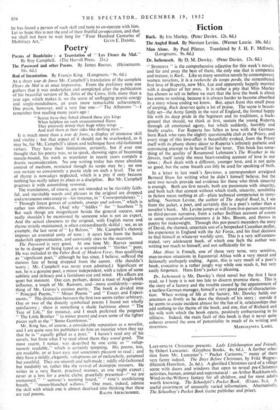Fiction •
The Angled Road. By Norman Levine. (Werner Laurie. 10s. 6d.) Dr. Ischenasch. By D. M. Dowley. (Peter Davies. 12s. 6d.) " SENSITIVE " is the comprehensive adjective for this week's novels, and far and away the best of them, the only one that is competent and mature, is Rack. Like so many sensitive novels by contemporary women novelists, it is a recherche du temps perdu, the remembered fit st love of Ruperta, now Mrs. Lee and apparently happily married with a daughter of her own. It is rather a pity that Miss Morley has chosen to tell us before we start that the love the book is about has come to nothing, because it is always harder to become absorbed in a story whose ending we know. But, apart from this small piece of carping, Rack deserves quite a lot of praise. The scene is beauti- fully set—the Army family in the west of England, the formal happy life with its deep pride in the 'regiment and its traditions, a back- ground that should, we think at first, sustain the young Ruperta through all emotional agony, but which suddenly, horribly and finally cracks. For Ruperta has fallen in love with the German- born Rack who runs the slightly questionable club at the Priory, and every stage of this love-affair is beautifully evoked, from the Priory itself with its phony showy decor to Ruperta's infinitely pathetic and convincing attempt to fit herself for her lover. This book has some- thing of the quality of Rosamond Lehmann's The Weather in the Streets, itself surely the most heart-rending account of love in our times ; Rack deals with a different, younger love, and is not quite so good, but the same breath can fitly be used for speaking of both.
In a letter in last week's Spectator, a correspondent arraigned Bernard Shaw for writing what he didn't himself believe, but the next two novels provide sad evidence for those who think sincerity is enough. Both are first novels, both are passionate with sincerity, and both lack that cement without which truth, sincerity, sensibility in fiction mean nothing at all—plain technical competence in story- telling. Norman Levine, the author of The Angled Road, is, I see from the jacket, a poet, and certainly this is a poet's rather than a novelist's book. Mr. Levine jumps at will from first-person narrative to third-person narrative, from a rather Swiftian account of events to some stream-of-consciousness a la Mrs. Bloom, and throws in poetry for makeweight. Through this pot-pourri meanders the story of David, the shamed, uncertain son of a henpecked Canadian pedlar, his experience in England with the Air Force, and his final decision to find himself at whatever worldly cost. This is a very self-concen- trated, very adolescent book, of which one feels the author was writing too much to himself, and not sufficiently for us.
Man Alone is French, one of those very terse, very sensitive, man-to-man situations in Equatorial Africa with a very moral and fictionally unshapely ending. Again, this is very much of a poet's book, evocative in a rather jungly way while one reads it, but very easily forgotten. Hans Erni's jacket is pleasing.
Dr. Ischenasch is Mr. Dowley's third novel but the first I have read, so I hope it is not too late to discern promise there. This is the story of a factory and the trouble caused by thd appointment of a tactless German manager, himself a very good piece of characterisa- tion. When writing of life at the factory, Mr. Dowley holds our attention as firmly as he does the threads of his story ; outside it he seems to create incident almost for the fun of it, relationships that add nothing to the theme of the book, and one, that of Richard and his wife with which the book opens, positively embarrassing in its silliness. Indeed, the main fault of this book is that it never quite coheres around the core of potentiality in much of its writing and


































 Previous page
Previous page